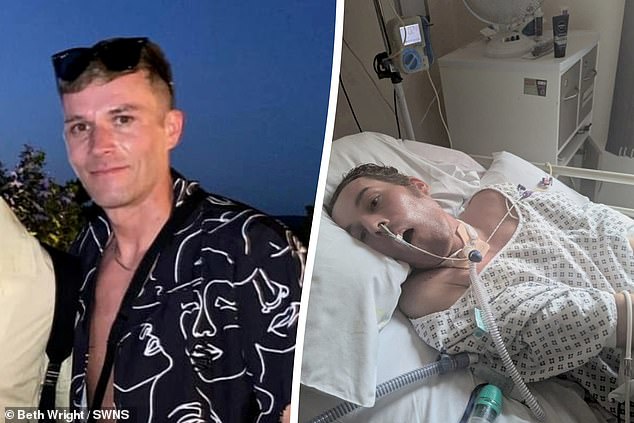A British fitness enthusiast has been left “locked” inside his own body after developing a rare disorder that left his entire body paralysed.
The only muscles Oli Coppock, 32, can still move are those in his eyes, which allow him to communicate by blinking.
The digital marketing specialist, from Warrington, began feeling “dizzy and fatigued” in May this year. He suffered a cardiac arrest and became unresponsive shortly afterwards.
Doctors discovered he had developed hydrocephalus (fluid on the brain), which usually responds well to a procedure to drain the fluid.
However, the condition had a catastrophic effect on Oli, who was soon paralysed and unable to eat, speak or move.
Oli Coppock was an active gym-goer and DJ until May this year, when he developed a devastating case of locked-in syndrome.

His girlfriend Beth, 33, said: ‘He can wiggle his fingers a bit and sometimes shrug his shoulders to say no.
Oli also relies on a tracheotomy to help him breathe and is being fed through a tube.
His condition is known as locked-in syndrome, which is used to describe diseases that damage the brain stem to such an extent that the body becomes completely paralyzed.
His girlfriend Beth, 33, said: ‘He can wiggle his fingers a bit and sometimes shrug his shoulders to say no.
‘Everything else is fine. He can still understand everything I say to him.
‘If I say to him “Oli, do you remember when we went to Benalmádena?” and he blinks.
‘I know he doesn’t like bananas, so I’ll ask him and then he’ll shrug and say no.
“Or if I ask him if he likes steak, then he’ll blink.
“It’s like he’s on a respirator because he can’t do anything for himself except blink, listen and look. His only entertainment is visits and listening to music.”

Oli had previously been diagnosed with a slow-growing brain tumour but recovered well from his treatment.
Oli’s ordeal began in the middle of last year, when he was given the shocking diagnosis of a brain tumor.
However, the cancer was growing slowly and after an operation to remove the tumour and six weeks of radiotherapy, he was recovering well and returned to the gym to continue his exercise routine.
‘“He just bounced back,” Beth said.Everything was completely back to normal: he was walking, very active, and working as a DJ as part of his side job.
‘We even went to Spain again and he was doing pull-ups in the park.’
But in May this year, Oli began to suffer from headaches, dizziness and fatigue.
At first, doctors turned him away, but after his family called for medical help, Oli was admitted to the hospital.
It was later discovered that he had fluid on his brain. Within a day, he went into cardiac arrest and was unresponsive.
Oli has since been diagnosed with locked-in syndrome.

“He came out of surgery and we thought he was like a warrior and that was it and we started moving on with our lives,” his girlfriend Beth said.
Beth is “heartbroken” as she thought they would be able to “move on” with their lives after having the tumour removed.
She said: “It’s heartbreaking. I was there with him when he was diagnosed with the brain tumour and when he was told it had grown and whether he should have surgery or not.
‘He was told there was a chance he might not be able to breathe or might need a tracheotomy, but we were told all of these things could have been temporary.
‘We never thought all this would happen to him.
“He came out of surgery and we thought he was like a warrior and that was it and we started moving on with our lives.”
Beth met Oli on the dating app Hinge four years ago and described him as “a lovely person” with “lots of friends”.
“You couldn’t try to say a bad word about him,” he said.
“He was the nicest person you could ever meet, that’s what everyone said. He’s just great.”
‘What bothers me the most is that I say to him: ‘Oli, are you okay?’ and he blinks to say yes, he’s okay, even though he’s not.’
Oli’s family and friends are now worried that he will be discharged from hospital and have to go to a nursing home for the “rest of his life”.
Now they have created a Go finance me Page to pray for Oli’s rehabilitation, with the aim that entering a private institution will help him improve in the future.
Beth said: ‘The doctors haven’t said it, but we’re worried he’ll end up in a nursing home when he least needs it for rehabilitation.
‘He shouldn’t be left in a nursing home at 32 for the rest of his life.
“We don’t even know when he’ll be discharged – it could be soon or it could be in a few months, so we’re living day by day.”


